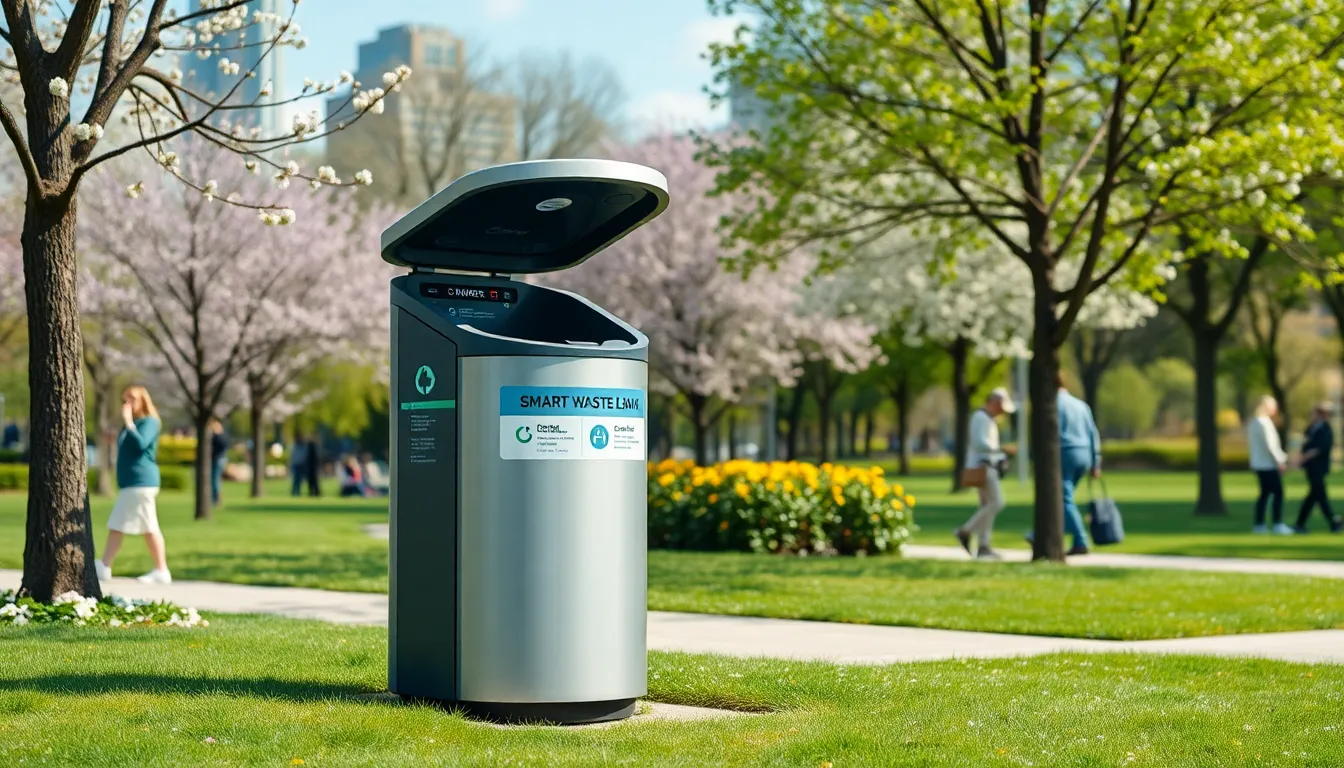In a world where trash seems to multiply faster than rabbits, the Internet of Things (IoT) is stepping in to save the day. Imagine a future where smart bins not only know when they’re full but also send you a friendly reminder to take out the trash. With IoT waste reduction, managing waste becomes less of a chore and more of a high-tech adventure.
Table of Contents
ToggleOverview of IoT Waste Reduction
IoT waste reduction leverages technology to enhance overall waste management systems. Smart bins equipped with sensors notify users when they reach capacity, minimizing overflowing waste and reducing landfill contributions. By integrating IoT devices into public spaces, cities can optimize collection routes based on real-time data, leading to significant fuel savings and lower operational costs.
Data analytics plays a crucial role in this process. Collecting information from IoT devices allows municipalities to analyze waste patterns and adjust schedules accordingly. Implementing this technology results in more frequent pickups during peak times and fewer during off-peak periods, enhancing efficiency.
Waste tracking sensors in disposal units promote responsible disposal practices. Users receive real-time feedback on their waste habits, encouraging recycling and composting. Consequently, community engagement in waste reduction efforts increases, leading to a measurable decrease in overall waste outputs.
Smart waste management solutions provide reliable metrics for organizations aiming for sustainability. Companies utilize IoT applications to monitor and manage waste generated by their operations. By analyzing insights, businesses identify areas for improvement and develop strategies to decrease waste production over time, aligning with corporate social responsibility goals.
Additionally, public awareness campaigns supported by IoT technologies can cultivate environmentally friendly habits among residents. As a result, eco-conscious initiatives resonate with communities, and collective efforts toward waste reduction become more impactful.
Integration of IoT in waste management not only transforms operational strategies but also encourages a shared responsibility toward environmental stewardship. Emphasizing the importance of this technology is vital in fostering a sustainable future while effectively managing waste.
Benefits of IoT Waste Reduction

IoT waste reduction offers several key benefits, making waste management more efficient and effective.
Environmental Impact
Smart bins equipped with sensors significantly lower the risk of overflowing waste. Less waste in landfills leads to reduced greenhouse gas emissions, promoting a healthier environment. Improved waste disposal practices nurtured by real-time feedback help communities recycle and compost more. Analytics-driven insights allow municipalities to identify waste patterns, making it easier to deploy resources efficiently. Directly engaging with individuals fosters a culture of responsibility toward environmental stewardship. Overall, these actions contribute to a meaningful reduction in ecological footprints.
Economic Advantages
Data from IoT systems optimizes waste collection routes, resulting in substantial fuel savings for municipalities. Reducing operational costs enhances budget allocation for other critical public services. Smart waste management solutions provide organizations with precise metrics to monitor waste production. Insights gained support strategic decision-making and sustainability initiatives, driving profitability. Enhanced efficiency in waste management translates to lower overall expenses for cities and businesses. Consequently, communities can reinvest savings into more environmentally friendly projects, amplifying the impact of IoT technologies.
Key Technologies in IoT Waste Reduction
IoT waste reduction relies on various technologies that enhance efficiency and sustainability in waste management. Notable innovations include sensors, monitoring systems, and data analytics.
Sensors and Monitoring Systems
Sensors play an integral role in IoT solutions for waste management. Smart bins equipped with proximity sensors detect fill levels in real-time. They notify users when bins are nearing capacity, preventing overflow and unsightly public spaces. Additionally, monitoring systems collect data on waste disposal practices. This data informs local authorities, allowing them to streamline collection schedules based on actual needs. IoT sensors are also effective in detecting contamination in recycling streams, promoting proper recycling habits among the public.
Data Analytics and Machine Learning
Data analytics significantly enhances the effectiveness of waste reduction efforts. By analyzing patterns from collected data, municipalities can optimize waste collection routes. Machine learning algorithms identify trends in waste generation, which help in predicting future disposal needs. For instance, cities can adjust pickup frequencies in areas with fluctuating waste contributions. Insights derived from data analytics also empower decision-makers to implement targeted campaigns. They can cultivate environmentally friendly habits among residents based on personalized feedback, ultimately fostering community engagement in waste reduction initiatives.
Case Studies of IoT Waste Reduction Initiatives
Numerous cities and organizations have successfully implemented IoT solutions to reduce waste. These examples showcase innovation in waste management and highlight the positive environmental impacts.
Successful Implementations
San Francisco utilized IoT technology in smart bins that notify the city when they reach capacity. This approach resulted in a 30% decrease in overflowing waste on streets. In London, real-time data analytics helped optimize waste collection routes, generating fuel savings of 20% while improving service efficiency. In Amsterdam, smart waste containers contributed to a 15% increase in recycling rates by providing users with immediate feedback on their disposal practices. Singapore’s use of IoT sensors in recycling bins led to a measurable rise in public engagement, fostering a community-centered approach to waste management.
Lessons Learned
Implementations of IoT waste reduction highlighted key insights. Understanding real-time data enhances responsiveness, leading to more efficient collection schedules. Engaging communities through real-time feedback strengthens recycling and composting habits significantly. Maintaining technical infrastructure remains crucial for sustained success with smart systems. Continuous monitoring of waste patterns allows cities to adapt and evolve their waste management strategies effectively. Collaboration between municipalities and technology providers proved essential for overcoming initial implementation challenges and ensuring a smooth transition.
Challenges in Implementing IoT Waste Reduction
Challenges exist in the journey toward effective IoT waste reduction. These hurdles can impede the progress of smart waste management solutions.
Technological Barriers
Technological barriers hinder the widespread adoption of IoT waste reduction initiatives. Limited infrastructure often prevents cities from equipping all waste bins with necessary sensors. Additionally, robust data integration systems must be developed to ensure the seamless sharing of information among various stakeholders. Lack of cybersecurity measures presents another significant concern, as vulnerabilities in IoT devices can lead to data breaches and misuse. Overcoming these technical challenges requires collaboration between municipalities and technology providers. Investing in research and development promotes innovative solutions to enhance IoT applications in waste management, leading to improved efficiencies and outcomes.
Public Awareness and Engagement
Public awareness and engagement pose significant challenges in implementing IoT waste reduction strategies. Many residents may not recognize how IoT technologies impact their waste management practices. Educating communities about the benefits of smart waste systems is essential for fostering participation. Campaigns that highlight the positive environmental effects, such as increased recycling rates and reduced landfill waste, encourage community buy-in. Creating engaging platforms for residents to provide feedback can enhance their connection to local initiatives. Moreover, transparency in reporting waste management progress fosters a sense of accountability and shared responsibility, crucial for the long-term success of these programs.
Future Trends in IoT Waste Reduction
Emerging technologies continue to shape the landscape of IoT waste reduction. Smart bins equipped with advanced sensors will increase in popularity among urban settings, providing critical data on fill levels and usage patterns. Automated collection systems are becoming more common, reducing the manual effort required for waste management.
Municipalities are exploring blockchain technology for tracking waste disposal, ensuring transparency and efficiency in operations. Real-time data analytics will play a pivotal role in optimizing waste collection routes, minimizing fuel consumption and emissions. Enhanced machine learning algorithms will analyze historical data, forecasting future waste trends and improving planning.
Community engagement initiatives will see new approaches utilizing gamification techniques. Residents will engage more actively by competing in waste reduction challenges, increasing recycling and composting rates. Educational campaigns supported by IoT insights will cultivate more environmentally responsible behaviors among citizens.
Investment in IoT infrastructure is anticipated to rise, enabling more cities to implement smart waste solutions. Partnerships between governments and tech companies will drive innovations, addressing barriers such as cybersecurity and infrastructure deficits. Universal acceptance and integration of IoT devices across waste management sectors will lead to standardization in practices.
Furthermore, advancements in sensor technology will allow for waste tracking at a granular level, enhancing the feedback loop for consumers. Cities adopting these technologies will report significant reductions in waste generation and improvements in recycling metrics. Ongoing collaboration among stakeholders will be crucial, as it fosters a comprehensive understanding of the environmental impacts and aids in creating sustainable waste management practices.
The integration of IoT in waste management marks a significant shift toward a sustainable future. By leveraging smart technologies, communities can enhance waste disposal practices and foster responsible habits among residents. Real-time data and analytics empower municipalities to optimize collection routes and reduce operational costs while minimizing environmental impact.
As cities continue to embrace IoT solutions, collaboration among stakeholders will be essential for overcoming challenges and driving innovation. The potential for improved recycling rates and decreased waste generation is immense. With ongoing advancements in technology and community engagement, the path to effective waste reduction through IoT is clearer than ever.





